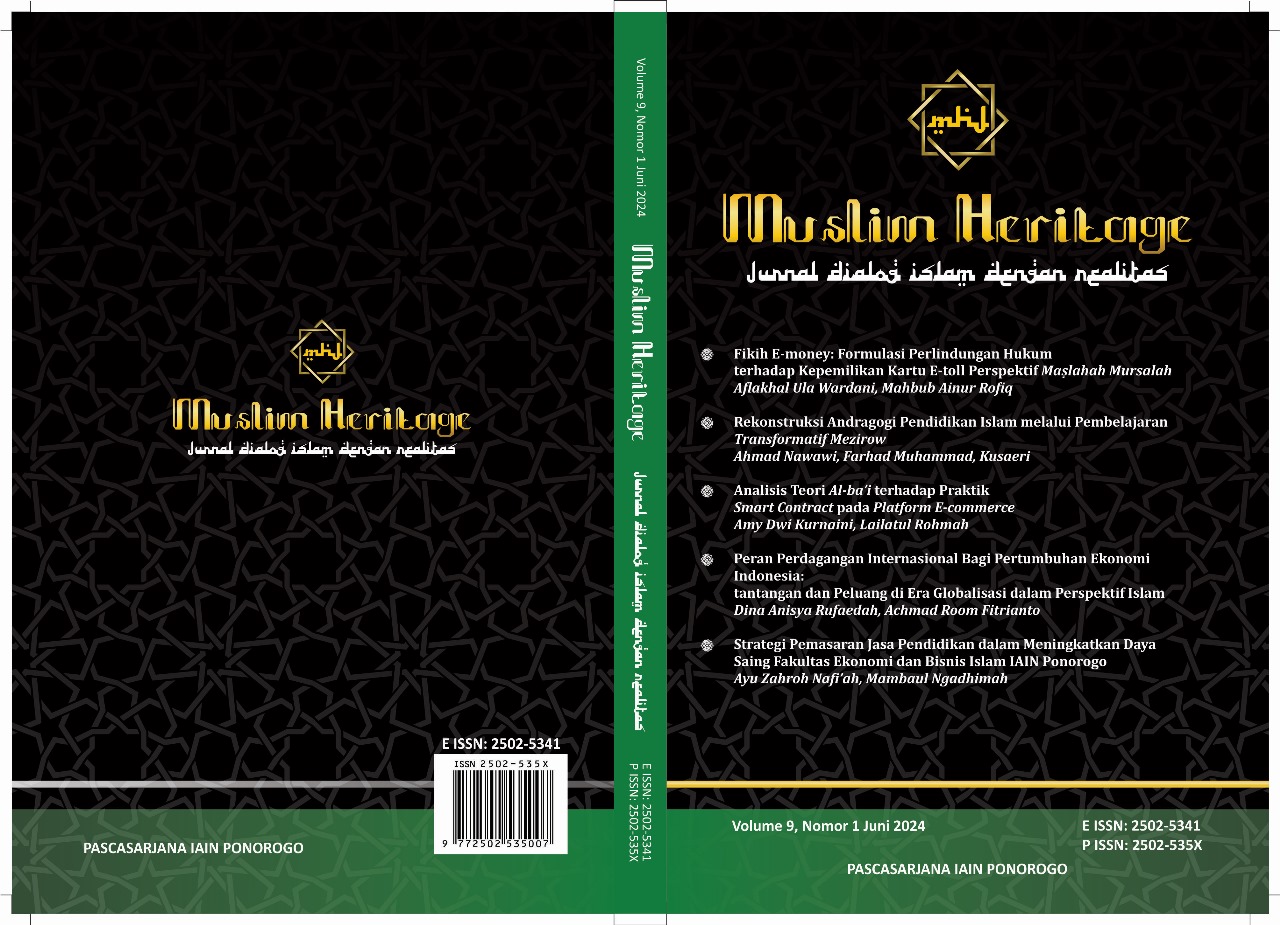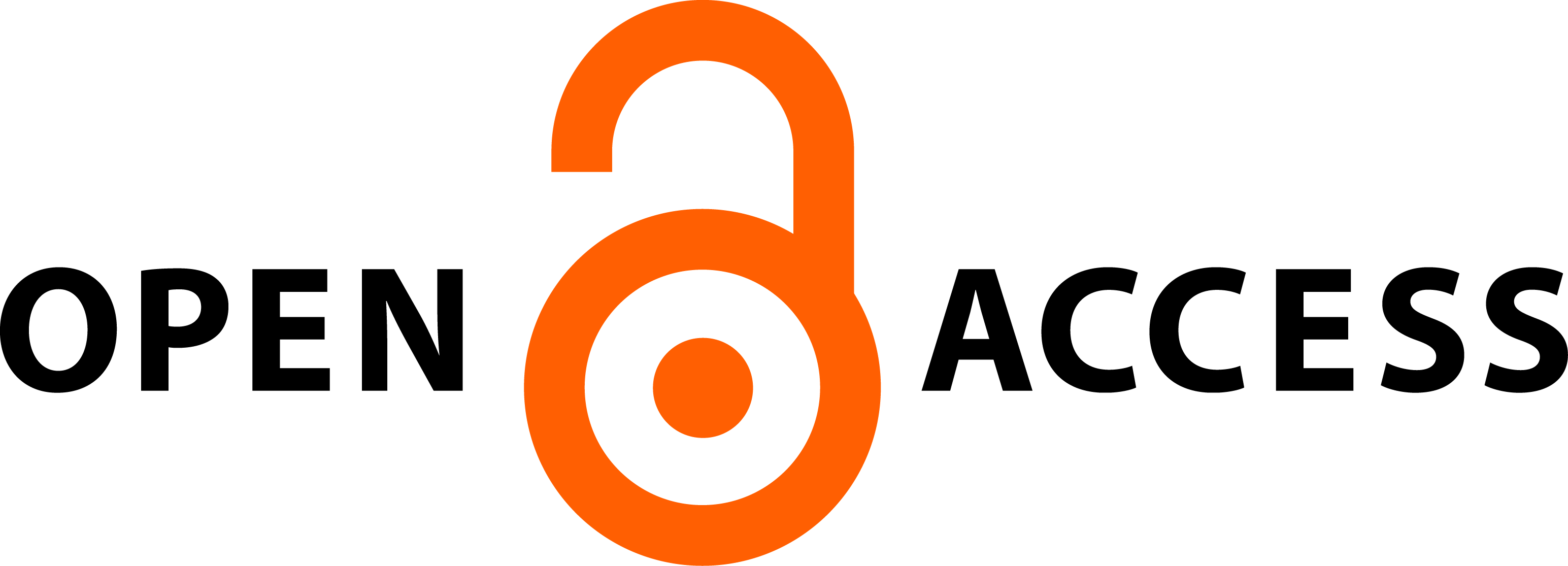REKONSTRUKSI ANDRAGOGI PENDIDIKAN ISLAM MELALUI PEMBELAJARAN TRANSFORMATIF MEZIROW
DOI:
https://doi.org/10.21154/muslimheritage.v9i1.7994Abstract
Abstract
Islamic andragogy in Indonesia is experiencing boredom with its pragmatic religious pattern,
wanting a renewal in interpreting religious values with a different approach, especially in the field
of education which determines the direction of the future, Mezirow’s transformative learning
theory makes a breakthrough by reconstructing the values that exist in a person through real
experiences that passed it. This research aims to reconstruct Islamic education for adults using
Mezirow’s transformative learning theory. This research uses a systematic literature review
method by collecting journal articles that match the theme raised and filtering them until they
become the main material for reviewing this paper. The research results show that Mezirow’s
transformative learning theory can be used to reconstruct Islamic education for adults by applying
ten phases/steps in it which have a significant influence on students’ cognitive, emotional and
social abilities which is in accordance with Islamic culture. So the use of this theory in learning
at various levels of education needs to be considered.
Abstrak
Andragogi Islam di Indonesia mengalami kejenuhan dengan pola religius pragmatisnya,
mengingkan sebuah pembaruan dalam meingterpretasikan nilai agama dengan pendekatan yang
berbeda khusunya di bidang pendidikan yang menentukan arah masa depan, teori pembelajran
transformatif Mezirow melakukan terobosan dengan merekonstruk nilai yang ada pada diri
seseorang melalui pengalaman nyata yang dilaluinya. Penelitian ini bertujuan untuk merekontruksi
pendidikan Islam bagi orang dewasa menggunakan teori pembelajaran transformatif Mezirow.
Penelitian ini menggunakan metode systematic literature review dengan mengumpulkan jurnal artikel yang sesuai dengan tema yang diangkat dan dilakukan penyaringan hingga menjadi bahan
utama dalam mengkaji tulisan ini. Hasil penelitian menunjukkan bahwa teori pembelajaran
transformatif Mezirow dapat digunakan untuk merekonstruksi Pendidikan Islam bagi orang
dewasa dengan menerapkan sepuluh fase/langkah di dalamnya yang memiki pengaruh signifikan
terhadap kemampuan kognitif, emosi, dan sosial siswa yang sesuai dengan kultur islam. Sehingga
pengunaan teori ini dalam pembelajaran di berbagai jenjang pendidikan perlu dipertimbangkan
References
Addae, David. “Adults Who Learn: Evaluating the Social Impact of an Adult Literacy Project in Rural South Africa.” Social Sciences and Humanities Open 3, no. 1 (2021): 100115. https://doi.org/10.1016/j.ssaho.2021.100115.
Afifah, Nurul. “Problematika Pendidikan Di Indonesia (Telaah Dari Aspek Pembelajaran).” Elementary: Jurnal Iilmiah Pendidikan Dasar 1, no. 1 (2017): 41”“74.
Ahsanulkhaq, Moh. “Membentuk Karakter Religius Peserta Didik Melalui Metode Pembiasaan.” Jurnal Prakarsa Paedagogia 2, no. 1 (2019). https://doi.org/10.24176/jpp.v2i1.4312.
Ainun Nadlif Istiqomah. BUKU AJAR ILMU PENDIDIKAN ISLAM. Sidoarjo: UMSIDA PRESS, 2022.
Al-Farabi, Mohammad, and Mohammad Al Farabi. Pendidikan Orang Dewasa Dalam Al-Qur’an. 1st ed. Jakarta: Kencana Prenadamedia Grup, 2018.
Alvi, Amatul Hafeez. “From Pedagogy to Andragogy in Post Covid-19 ESP Courses: A Customized Blended Learning Model for English in Medicine at a Saudi University.” World Journal of English Language 13, no. 2 (2023): 77”“85. https://doi.org/10.5430/wjel.v13n2p77.
Alzhrani, Nesreen. “Setting the Stage for Transformative Learning in MA TESOL Classrooms at a Saudi University.” Education as Change 26 (2022). https://doi.org/10.25159/1947-9417/11292.
Amiruddin, Fiskia Rera Baharuddin, Takbir, Wirawan Setialaksana, and Nurlaela. “Andragogy, Peeragogy, Heutagogy and Cybergogy Contribution on Self-Regulated Learning: A Structural Equation Model Approach.” International Journal of Instruction 16, no. 3 (2023): 551”“72. https://doi.org/10.29333/iji.2023.16330a.
Aristyasari, Yunita Furi. “Pendidikan Islam Progresif Muhammad Iqbal.” Al Ghazali 2, no. 2 (2019): 32”“50.
Bakar, Rosdiana A. “Kursus Privat Agama Alternatif Pendidikan Islam Bagi Masyarakat Perkotaan.” NIZHAMIYAH Jurnal Pendidikan Islam Dan Teknologi Pendidikan 7, no. 1 (2017): 1”“12. http://jurnaltarbiyah.uinsu.ac.id/index.php/nizhamiyah/article/view/149.
Belawati, Tian. Pembelajaran Online. 1st ed. Tangerang Selatan: Universitas Terbuka, 2019.
Berglund, Jenny, and Bill Gent. “Memorization and Focus: Important Transferables between Supplementary Islamic Education and Mainstream Schooling.” Journal of Religious Education 66, no. 2 (2018): 125”“38. https://doi.org/10.1007/s40839-018-0060-1.
Budiman, S., dkk. “Manajemen Strategik Pendidikan Islam.” Jurnal Ilmu Sosial Dan Pendidikan, 2021. https://doi.org/https://doi.org/10.36312/jisip.v5i3.2197/.
Christie, Michael, Michael Carey, Ann Robertson, Peter Grainger. “Putting Transformative Learning Theory into Practice.” Australian Journal of Adult Learning 55, no. 1 (2015): 9”“30. https://ajal.net.au/2015-2/.
Dix, Michael. “The Cognitive Spectrum of Transformative Learning.” Journal of Transformative Education 14, no. 2 (2016): 139”“62. https://doi.org/10.1177/1541344615621951.
Eschenbacher, Saskia, and Ted Fleming. “Transformative Dimensions of Lifelong Learning: Mezirow, Rorty and COVID-19.” International Review of Education 66, no. 5”“6 (2020): 657”“72. https://doi.org/10.1007/s11159-020-09859-6.
Falaq, Yusuf, Noviani Achmad Putri, Muh. Sholeh, and Cahyo Budi Utomo. “Teori Pembelajaran Transformatif Pada Pendidikan Ips.” Harmony: Jurnal Pembelajaran IPS Dan PKN 7, no. 2 (2022): 90”“97. https://doi.org/10.15294/harmony.v7i2.61711.
Fauzi, Muhammad Iqbal. “Paulo Freire Dan Pendidikan Untuk Transformasi Sosial Abad 21.” Prosiding Seminar Nasional Pascasarjana Universitas Negeri Semarang, 2021, 286”“88.
Fleming, Ted. “Mezirow and The Theory of Transformative Learning.” In Critical Theory and Transformative Learning, edited by Victor Wang, 120”“36. IGI Global, 2018. https://doi.org/10.4018/978-1-5225-6086-9.
Fombona, Javier, Alba Fombona-Pascual, and Esteban Vazquez-Cano. “References on Innovative Methodologies for Adult Training.” Studies in the Education of Adults 55, no. 1 (2023): 259”“81. https://doi.org/10.1080/02660830.2023.2166740.
Garnier, Philippe. “Transforming to Teach in an Inclusive Paradigm.” New Educational Review 68 (2022): 129”“38. https://doi.org/10.15804/tner.22.68.2.10.
Guat Im Bok. “Belonging in Distance Learning Perspectives of Adult Learners in Malaysia.” Learning and Teaching 16, no. 1 (2023): 55”“76. https://doi.org/https://doi.org/10.3167/latiss.2023.160104.
Haq, Vick Ainun. “Konsep Pendidikan Islam Kritis Perspektif Nurcholish Madjid.” Jurnal Al-Fatih IV, no. 2 (2021): 288”“306. http://jurnal.stit-al-ittihadiyahlabura.ac.id/index.php/alfatih/article/view/153%0Ahttp://jurnal.stit-al-ittihadiyahlabura.ac.id/index.php/alfatih/article/download/153/129.
Hardika, Eny Nur Aisyah, Kukuh Miroso Raharjo, and Dania Aptianingsari. Pembelajaran Transformatif Model Pembelajaran Yang Memberdayakan. Unm, 2020.
Hiryanto. “PEDAGOGI, ANDRAGOGI DAN HEUTAGOGI SERTA IMPLIKASINYA DALAM PEMBERDAYAAN MASYARAKAT.” Dinamika Pendidikan 22 (2017): 65”“71. https://journal.uny.ac.id/index.php/dinamika-pendidikan/article/view/19771.
Hodge, Steven. “Transformative Learning as an ”˜Inter-Practice’ Phenomenon.” Adult Education Quarterly 64, no. 2 (2014): 165”“81. https://doi.org/10.1177/0741713613520405.
Imelda, Reza, and Muhammad Yunan Harahap. “Muhasabah An-Nafs Untuk Mengenali Potensi Diri
Siswa Di Madrasah Aliyah Swasta Miftahussalam Medan.” Jurnal Pendidikan Dan Kewirausahaan 11, no. 2 (2023): 400”“414. https://doi.org/10.47668/pkwu.v11i2.748.
Ismail, Wan Chik Nurida, and Norzaini Azman. “Diverse Learning Styles of Non Formal Adult Learners in Community Colleges in Malaysia.” Procedia - Social and Behavioral Sciences 7, no. C (2010): 139”“44. https://doi.org/10.1016/j.sbspro.2010.10.020.
Jaya, Farida. “Desain Pembelajaran Pendidikan Agama Islam Transformatif.” Tazkiya 10, no. 2 (2021): 6.
Kang, Dae Joong, and Sungmin Cho. “Lost in Travel or a Different Conception? (Mis-)Appropriation of Transformative Learning Theory in the Republic of Korea.” Asia Pacific Education Review 18, no. 2 (2017): 163”“74. https://doi.org/10.1007/s12564-017-9481-x.
King, Kelley M., Kathryn V. Dixon, Ricardo González-Carriedo, and Lisbeth Dixon-Krauss. “Transformation and Cross-Cultural Adaptation of Teacher Candidates in an International Student Teaching Program.” Journal of Transformative Education 20, no. 2 (2022): 138”“58. https://doi.org/10.1177/15413446211028564.
Lee, Kyungmee, and Clare Brett. “Dialogic Understanding of Teachers’ Online Transformative Learning: A Qualitative Case Study of Teacher Discussions in a Graduate-Level Online Course.” Teaching and Teacher Education 46 (2015): 72”“83. https://doi.org/10.1016/j.tate.2014.11.001.
Lehane, Louise. “Experiential Learning””David A. Kolb BT - Science Education in Theory and Practice: An Introductory Guide to Learning Theory.” edited by Ben Akpan and Teresa J Kennedy, 241”“57. Cham: Springer International Publishing, 2020. https://doi.org/10.1007/978-3-030-43620-9_17.
Machynska, N., & Boiko, H. “Andragogy-The Science of Adult Education: Theoretical Aspects.” Journal of Innovation in Psychology, Education and Didactics, 2020, 25”“34. https://jiped.ub.ro/archives/2807.
Merriam, S. B., & Bierema, L. L. Adult Learning: Linking Theory and Practice. Jossey Bass, 2014.
Merriam, S. B. “Andragogy and Self-Directed Learning: Pillars of Adult Learning Theory. New Directions for Adult and Continuing Education.” Special Issue:The New Update on Adult Learning Theory 2001, no. 89 (2001). https://doi.org/https://doi.org/10.1002/ace.3.
Mezirow, J. Education for Perspective Transformation: Women’s Re-Entry Programs in Community Colleges. New York: Center for Adult Education, Teachers College, Columbia University., 1978.
””””””. “Perspective Transformation.” Adult Education 28, no. 2 (1978): 100”“110. https://doi.org/10.1177/07417 13678 02800 202.
””””””. “Transformation Theory and Social Action: A Response to Collard and Law. Adult.” Education Quarterly 39, no. 3 (1989): 169”“175. https://doi.org/10.1177/00018 48189 03900 3005.
Mohamad, Maslawati, Harieza Hussin, and Shahizan Shaharuddin. “Adult Learners’ Perceptions of Designed Hypermedia in a Blended Learning Course at a Public University in Malaysia.” Turkish Online Journal of Educational Technology 14, no. 1 (2015): 1”“8.
Nasukah, Binti, and Endah Winarti. “Teori Transformasi Dan Implikasinya Pada Pengelolaan Lembaga Pendidikan Islam.” Southeast Asian Journal of Islamic Education Management 2, no. 2 (2021): 177”“90. https://doi.org/10.21154/sajiem.v2i2.43.
Rahayani, Yayan. “Restructuring and Redesigning the Pesantren Toward An Effective Educational Institution.” TARBIYA: Journal of Education in Muslim Society 4, no. 2 (December 2017): 147”“127. https://doi.org/10.15408/tjems.v4i2.8009.
Rina Nofriana, Wahidah Fitriani. “Konsep Pendidikan Andragogi Dalam Perspektif Islam.” Qalam 12 (2023).
Risdiana, Aris. “Transformasi Peran Da’i Dalam Menjawab Peluang Dan Tantangan (Studi Terhadap Manajemen SDM).” Jurnal Dakwah. Vol. XV, 2014.
Robinson, Andrew Alan, and Leah Levac. “Transformative Learning in Developing as an Engaged Global Citizen.” Journal of Transformative Education 16, no. 2 (2018): 108”“29. https://doi.org/10.1177/1541344617722634.
Rojo, Jacqueline, Lucie Ramjan, Ajesh George, Leanne Hunt, Leeanne Heaton, Amandeep Kaur, and Yenna Salamonson. “Applying Mezirow’s Transformative Learning Theory into Nursing and Health Professional Education Programs: A Scoping Review.” Teaching and Learning in Nursing 18, no. 1 (2023): 63”“71. https://doi.org/10.1016/j.teln.2022.09.013.
Romlah, S. “Sistem Penyelenggaraan Pendidikan Islam Non Formal Di Indonesia” 15, no. 1 (2020): 1”“14.
Rozi, Bahru. “Problematika Pendidikan Islam Di Era Revolusi Industri 4.0.” Jurnal Pendidikan Islam 9, no. 1 (2020): 33”“47. https://doi.org/10.38073/jpi.v9i1.204.
Ruhose, Jens, Stephan L. Thomsen, and Insa Weilage. “No Mental Retirement: Estimating Voluntary Adult Education Activities of Older Workers.” Education Economics, 2023, 1”“34. https://doi.org/10.1080/09645292.2023.2229078.
Saefudin, A., & Rokhmah, H. “Thought Contributions of Paulo Freire and Abdurrahman Wahid in Educational Philosophy.” Al-Tadzkiyyah: Jurnal Pendidikan Islam 13, no. 2 (2022): 215”“239.
Saifuddin, Muhammad. “Andragogi (Teori Pembelajaran Orang Dewasa).” Andragogi, 2010.
Smith, Peter K., and A. D. Pellegrini, eds. Psychology Of Education: Majot Themes. Vol. 3. London: RoutledgeFalmer, n.d.
Sritama, I Wayan. “Konsep Dasar Dan Teori Pendidikan Agama Islam.” Inovatif 5, no. 1 (2019): 132”“46.
Taimur, Sadaf, and Motoharu Onuki. “Design Thinking as Digital Transformative Pedagogy in Higher Sustainability Education: Cases from Japan and Germany.” International Journal of Educational Research 114, no. November 2021 (2022): 101994. https://doi.org/10.1016/j.ijer.2022.101994.
Tri Joko Raharjo, Tri Suminar, Mu’arifuddin. “Peran Pusat Kegiatan Belajar Masyarakat Dalam Menanggulangi Kemiskinan Melalui Pendidikan Nonformal Di Jawa Tengah.” Journal of Nonformal Education 21”“38 (2016). https://journal.unnes.ac.id/nju/index.php/jne/article/view/5310/4220.
Vidya Bhagat, Mainul Haque, Yasrul Izad Bin Abu Bakar, Rohayah Husain &, and Che Mat Khairi. “Emotional Maturity of Medical Students Impacting Their Adult Learning Skills in a Newly Established Public Medical School at the East Coast of Malaysian Peninsula.” Advances in Medical Education and Practice, 2022. https://www.tandfonline.com/doi/full/10.2147/AMEP.S117915.
Wan Chik Nurida Ismaila, Norzaini Azmana, Wan Chik Nurida Ismail, and Norzaini Azman. “Diverse Learning Styles of Non Formal Adult Learners in Community Colleges in Malaysia.” Procedia - Social and Behavioral Sciences 7, no. C (2010): 139”“44. https://doi.org/10.1016/j.sbspro.2010.10.020.
Wang, Victor C.X., and Valerie A. Storey. “Andragogy and Teaching English as a Foreign Language in China.” Reference Librarian 56, no. 4 (2015): 295”“314. https://doi.org/10.1080/02763877.2015.1057680.
Widodo, Hendro. “Pragmatisme Instrumental Dalam Sketsa Pendidikan Islam Di Indonesia.” Edukasia Islamika 4, no. 2 (2017): 172”“90. https://doi.org/https://doi.org/10.28918/jei.v4i2.2297.
Xiao, Y., & Watson, M. “Guidance on Conducting a Systematic Literature Review.” Journal of Planning Education and Research 39, no. 1 (2019): 93”“112. https://doi.org/https://doi.org/10.1177/0739456X17723971.
Zaim, Muhammad. “Pemikiran Pendidikan Al-Zarnuji (Rekontruksi Epistimologi Pendidikan Modern Berbasis Sufistik-Etik).” Muslim Heritage 5, no. 2 (2020): 305. https://doi.org/10.21154/muslimheritage.v5i2.2360.
Downloads
Additional Files
Published
Issue
Section
License
Requirements to be met by the author as follows:
- Author storing copyright and grant the journal right of first publication manuscripts simultaneously with licensed under the Creative Commons Attribution License that allows others to share the work with a statement of the work's authorship and initial publication in this journal.
- Authors can enter into the preparation of additional contractual separately for non-exclusive distribution of a rich version of the journal issue (eg:post it to an institutional repository or publish it in a book), with the recognition of initial publication in this journal.
- Authors are allowed and encouraged to post their work online (eg, in institutional repositories or on their website) prior to and during the submission process, because it can lead to productive exchanges, as well as citations earlier and more severe than published works. (see The Effect of Open Access).

















